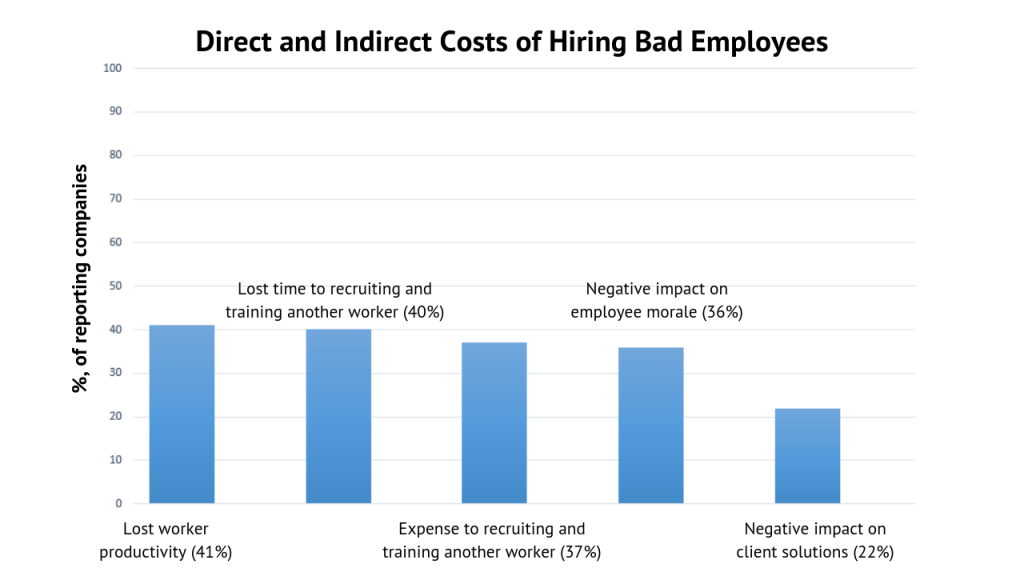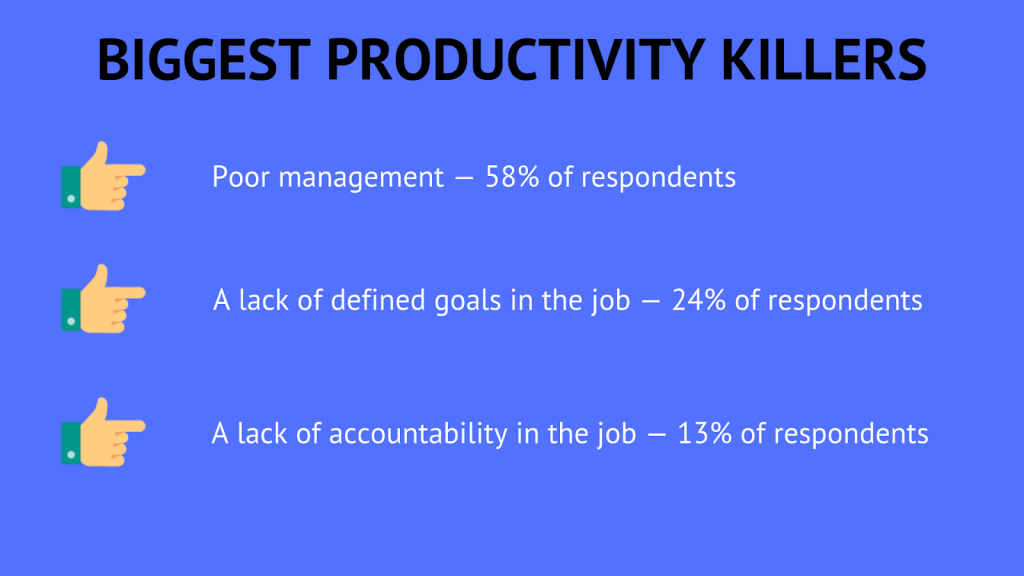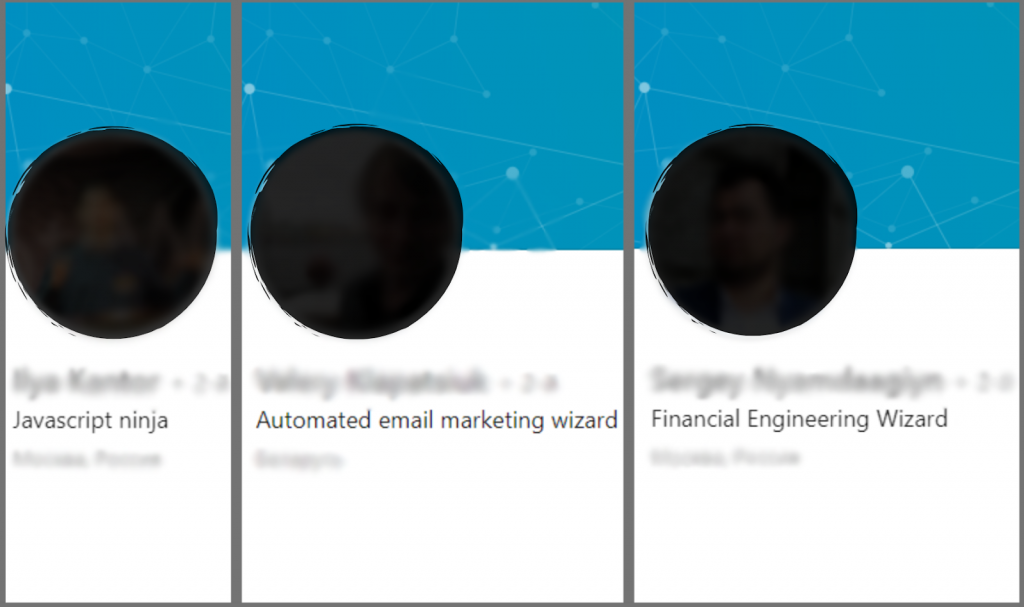A successful software project is a team effort. And the most essential feature of putting together a productive team is picking people who are not only highly skilled but also team players.
In this article, we will consider two questions: What’s the real cost of a bad hire? And: How do you decide whether to let your dedicated development team go?
Hiring Bad Dedicated Developers Is Expensive
Recruitment expenses can climb up to $34,000 per hire, covering the cost of advertising the position, recruitment, management, office work, and new-employee training. Employees who fail to produce as expected are expensive. CareerBuilder says that, in 2016, companies lost around $14,900 on every bad hire they made.
It’s not just the recruitment expenses that are lost; there may also be a loss of revenue when the hired team fails to meet performance requirements or compromises the working culture.
Even after laying off a bad-performing team, most companies experience compromised quality of work and more time lost on finding, recruiting and training another team.
The chart below shows some of the direct and indirect costs that many companies experience due to poor recruitment:
The best way to avoid or at least minimize financial losses is to make sure you not only hire the best dedicated development teams, but also cut loose ends as fast as possible.
5 Reasons It May Be Time to Find Another Development Team
Here are some factors to consider in any decision about whether to fire your team of coders:
1. Inability to Deliver
Software engineering is a rapidly evolving sphere of business. Technical requirements change all the time, making it the developers’ responsibility to constantly learn and practice new technologies, so as to write the best code. Those who fail to keep abreast of these changes fail to maintain the high quality and maintainability of their code.
Sometimes, programmers are good with technology, but find themselves unable to sacrifice the perfect solution for the optimal choice. They end up wasting efforts on low-priority work, compromising the development time and budget.
2. Lack of Critical Thinking
Critical thinking is essential for a software team that wants to meet the high demands of a quickly growing business. When building custom software solutions, being able to respond appropriately to problems as they arise helps the team finish the project on time and to build and test it properly.
Programmers with “tunnel vision,” who can only follow the project manager’s instructions, are not always bad for business. But since they are the ones closest to the software product, they are the only people who can foresee problems that a project manager might overlook.
That’s where the ability to look at the project with a critical mind, decide what’s wrong with it, and work at making it better comes in handy.
Dedicated developers whose focus is concentrated on just one task have a harder time seeing the big picture and deciding which feature needs addressing as soon as possible.
Critical thinkers dive deep into the problem the software must solve. The developers who understand that problem are able to come up with the most optimal solutions and bring value to the product.
3. Lack of Development Workflow
A good team is a well-organized team. That means having effective development processes, which for most software projects include:
– deployment schedule;
– style guidelines;
– code reviews;
– quality assurance;
– communication.
A well-designed workflow helps the team formulate and prioritize tasks, as well as set reasonable deadlines. A workflow pattern established over several projects makes it easier to approach similar projects.
Without established processes, custom software development may take an undetermined time, with developers wasting tons of time and money on problems that are too expensive and not relevant enough to solve.
Moreover, with the absence of code reviews, the software product may come out badly-developed. Without proper testing, the software won’t work the way it should, and with no communication, the team won’t be able to coordinate the work efficiently.
As an SHRM study has found, many workers report the absence of an established workflow as a key cause of productivity decrease:
Source: SHRM
4. No Coding Standard
Always remember that developers come and go, but the project will stay with you. There may come a time when you need to fire your developers and get new ones, and those folks will have to carry the development on.
It is a truism that developers hate legacy code. Coding standards are meant to keep code readable and bug-free, which allows the new team to figure out quickly what stage a software project is at and jump right into developing it further.
If programmers don’t want to put effort into polishing their code, it means they do not care about the project and aren’t taking pride in their work.
A decent developer follows best coding practices — a set of rules in the software development community — and writes software documentation properly
5. “Ninjas”
A couple of years ago, you might have heard companies looking to hire a JavaScript “Ninja,” or Python “Rockstar,” or .NET “Unicron,” or “Marketing Wizard.” We’ll just use “ninja” here.
Source: LinkedIn
Most often a “ninja” is a software developer who has an outstanding set of hard skills, strong and deep technical expertise and many years of programming experience — someone who is really good at what s/he does.
But here is the catch — people who are the best with code are often the worst with their team. They usually do not care about the project priorities, nor about the PM’s tasks, but will opt to work on the features they feel like working on.
According to Debbie Madden, contributing author at Huffpost and CEO of Stride, they do not hire “ninjas” because “they are just so good they are allowed to do whatever they want. It is true there are people who are amazing developers and also play well with others. We should all aim to hire these people.”
“Ninjas” may also spread toxic behavior among team members. For example, the ninja might start slacking off because he knows he can catch up quickly. If he does so, other team members may start doing the same thing, leading to missed deadlines and unfinished projects.
Just one “ninja” doesn’t make the team completely dysfunctional, though his behavior might compromise the workflow. If your outsourcing developers have a “ninja” among them, consider taking action to get that person more engaged in teamwork — or have him replaced.
Keep in mind that the company providing dedicated programmers takes on responsibility for compiling a team. If your team doesn’t interact proactively, consider switching contractors.
Want to hire a dedicated development team?
Aleksandra Golik
Head of Sales
at HQSoftware
Choose Your Dedicated Development Team Wisely
Creating custom software solutions is a perfect opportunity for a team to shine as a functional unit. The success of the project is determined not only by the technical background of its creators but also by their ability to work together towards perfecting the product.
A good team is a team where each member tries his or her best to stay in the loop at all times, learning about new technologies and programming methods. On top of that, they are learning to look at their work with a critical eye, pinpoint the weak spots in the project and come up with the optimal approach to any problem.
A good dedicated software development team has a well-established approach to a new custom software project. The development process is structured and streamlined, allowing the team to create a software product in the shortest time possible with the smallest number of issues experienced.
A coding standard helps the team keep the code readable for others and easy to maintain.
Soft skills are also important: a software project requires good communication between team members with different points of view. Those who prefer not to do so — so-called “ninjas” — disrupt the workflow and dispirit the team.

HQSoftware Founder
Having founded the company in 2001, uses his broad knowledge to drive the company forward. Ready to share his wisdom on software development and technology insights
Related Posts
View All
We are open to seeing your business needs and determining the best solution. Complete this form, and receive a free personalized proposal from your dedicated manager.

Sergei Vardomatski
Founder









